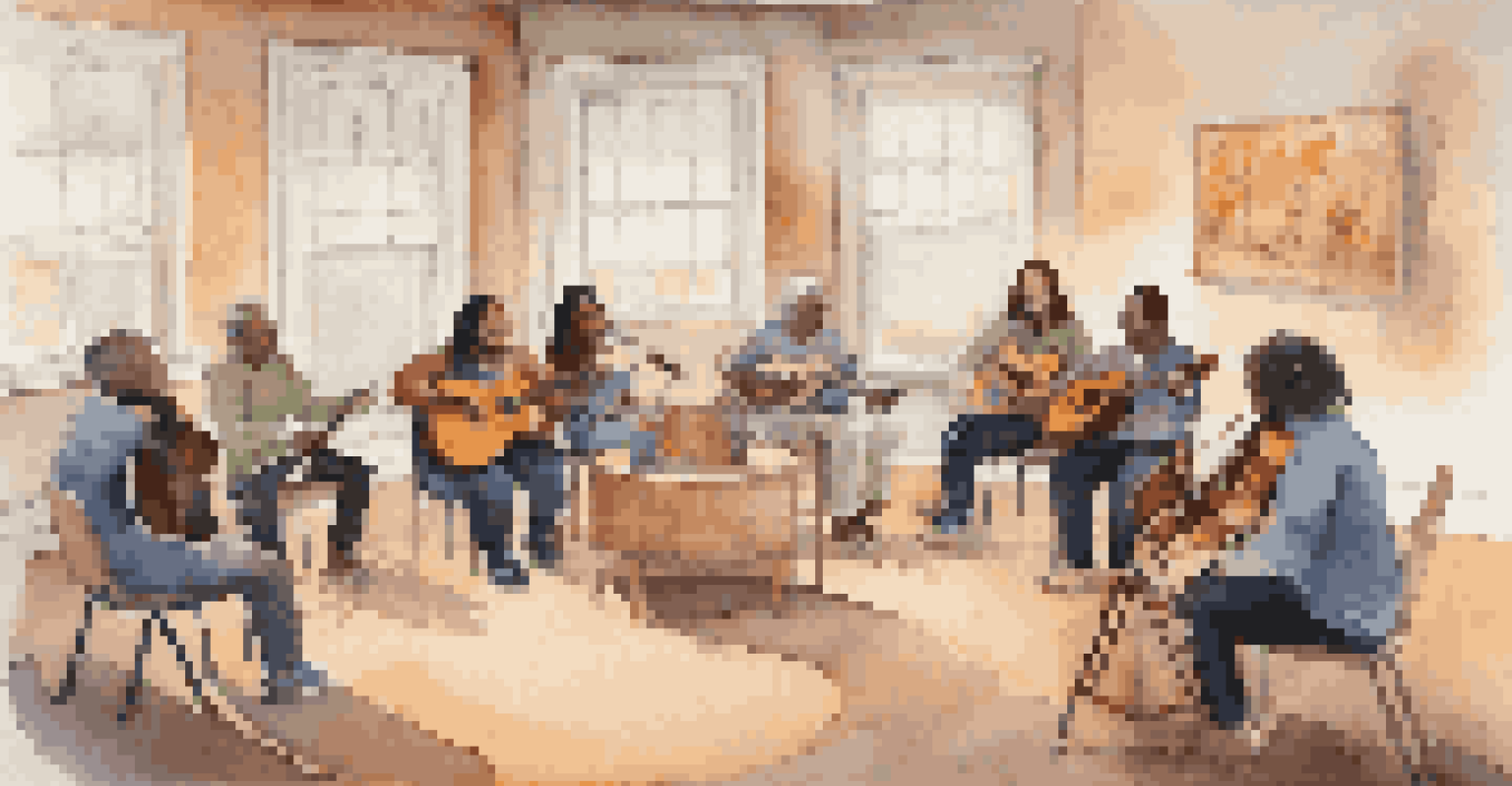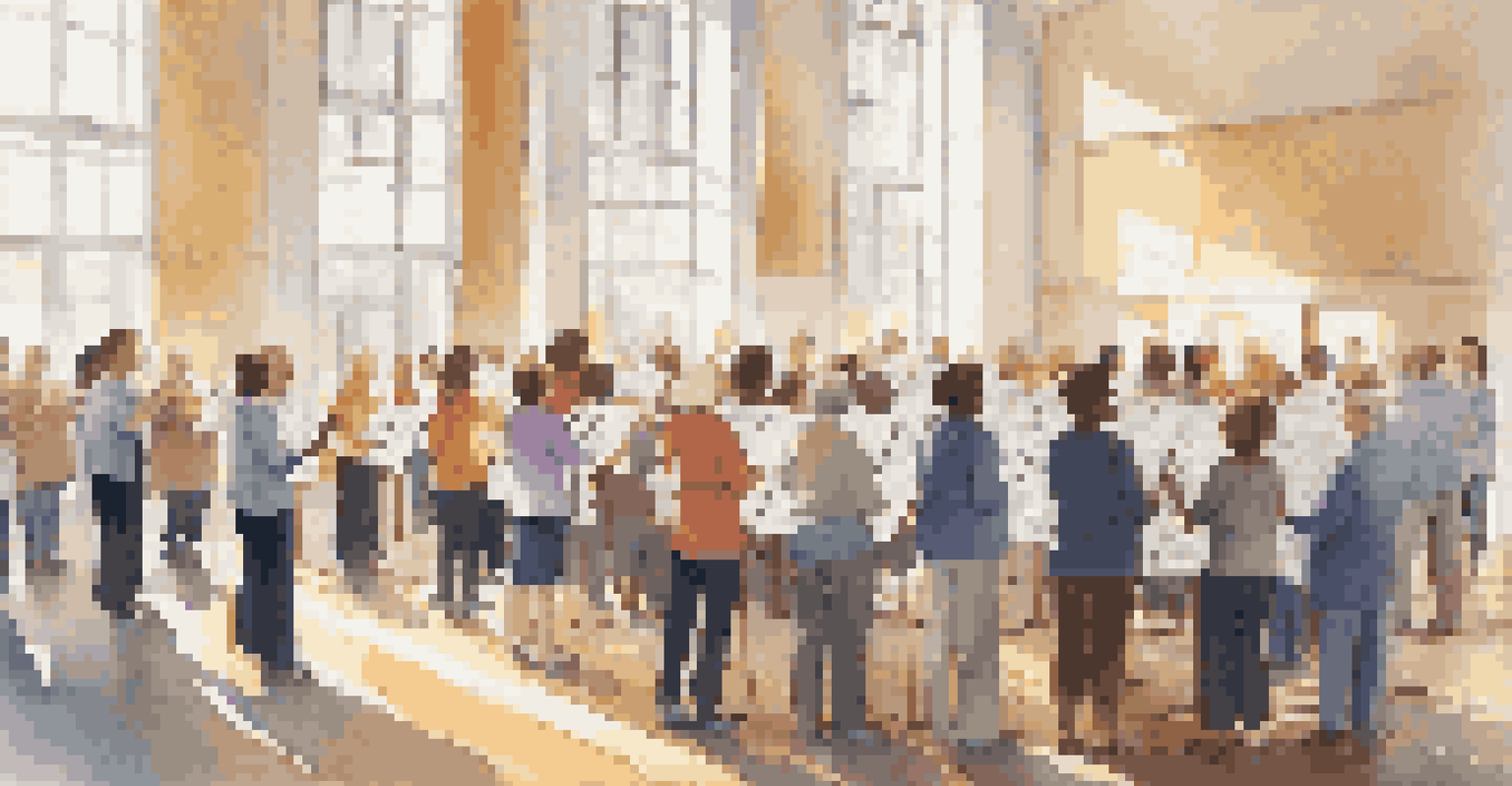Music and Community Health: Enhancing Well-being Together

The Healing Power of Music in Communities
Music has an incredible ability to connect people, serving as a universal language that transcends barriers. In communities, music can play a vital role in promoting mental health, providing a sense of belonging and support. Whether through local concerts, community choirs, or informal gatherings, these musical experiences can uplift spirits and foster connections.
Music can change the world because it can change people.
Consider a small town where neighbors gather for a weekend jam session. This shared experience not only brings joy but also helps participants cope with stress and anxiety. The rhythm of the music creates a heartbeat for the community, encouraging bonding and shared memories that are essential for mental well-being.
Research shows that engaging in musical activities can reduce feelings of loneliness and boost overall happiness. As communities come together through music, they create a supportive network that enhances individual and collective well-being.
Music as a Tool for Mental Health Support
Music therapy has emerged as a vital resource for individuals struggling with mental health issues. This therapeutic approach uses music to address emotional, cognitive, and social needs, offering a creative outlet for self-expression. From songwriting to listening sessions, music therapy can be tailored to meet diverse needs within the community.

For example, a local mental health organization might host music therapy workshops, allowing participants to explore their feelings through song. This not only aids in emotional healing but also fosters a sense of community among attendees who share similar experiences. By engaging with music, individuals can find comfort and understanding in the support of others.
Music Boosts Mental Health
Engaging in musical activities can reduce loneliness and enhance overall happiness, creating supportive networks in communities.
Moreover, the rhythmic and melodic elements of music can activate brain regions associated with pleasure and reward, providing a natural mood boost. This makes music a powerful ally in promoting mental health and encouraging community members to seek help and connection.
Fostering Social Connections Through Group Music Activities
Group music activities like choirs, bands, and drumming circles serve as fantastic platforms for social interaction. These shared experiences help build relationships, breaking down social barriers and promoting inclusivity. When people come together to create music, they form bonds that can last a lifetime, enhancing the fabric of the community.
Where words fail, music speaks.
Imagine a community choir where individuals from diverse backgrounds unite to create harmony. Each voice contributes to a greater whole, illustrating how collaboration fosters unity and understanding. These connections can lead to friendships that extend beyond the music, creating a supportive network that enriches the community.
Furthermore, participating in group music activities can boost self-esteem and confidence. As individuals share their talents and support one another, they cultivate a sense of belonging that is crucial for overall well-being.
Music's Role in Cultural Identity and Expression
Music is often deeply intertwined with cultural identity, serving as a vehicle for expression and storytelling. In diverse communities, music can highlight unique traditions and histories, fostering pride and understanding among members. Celebrating cultural music not only enriches the community but also promotes awareness and appreciation for different backgrounds.
For instance, cultural festivals featuring traditional music can draw in residents and visitors alike, creating a vibrant atmosphere of celebration and learning. Participants can experience the richness of different cultures through dance, food, and, of course, music, which builds bridges between generations and communities.
Music Fosters Social Bonds
Group music activities promote social interaction and inclusivity, helping individuals form lasting relationships within their communities.
By encouraging cultural expression through music, communities can nurture respect and empathy, essential components for a harmonious society. This musical exchange not only honors heritage but also inspires future generations to continue the cultural dialogue.
The Impact of Music Education on Community Health
Music education programs in schools and community centers play a significant role in promoting health and well-being. Learning to play an instrument or participate in a musical ensemble can enhance cognitive skills, boost emotional intelligence, and foster teamwork. These benefits extend beyond the classroom, positively impacting community dynamics.
Consider how a local school band not only teaches students musical skills but also instills discipline and collaboration. As students work together toward a common goal, they develop interpersonal skills that are vital for success in life. This sense of achievement can also translate into improved mental health and resilience.
Moreover, music education can provide a safe space for at-risk youth, offering them an alternative to negative influences. By engaging with music, young people can channel their energy into something constructive, which ultimately benefits the entire community.
Music Events: Building Community and Encouraging Participation
Community music events such as concerts, festivals, and open mic nights serve as a catalyst for bringing people together. These gatherings create opportunities for residents to connect, share experiences, and celebrate their love for music. Importantly, they also encourage participation from diverse groups, strengthening community ties.
For example, a neighborhood block party featuring local musicians can draw families and individuals from all walks of life. This shared enjoyment fosters a sense of belonging and community pride, as people come together to appreciate local talent. Such events often lead to increased social cohesion, enhancing overall community health.
Music Education Enhances Well-Being
Music education programs develop essential life skills and provide a safe space for youth, positively impacting community dynamics.
Additionally, these music events can stimulate local economies, as they attract visitors and encourage spending at local businesses. This creates a win-win situation where the community thrives both socially and economically.
The Future of Music and Community Health Initiatives
Looking ahead, the integration of music into community health initiatives is poised to grow. With increasing awareness of the importance of mental and emotional well-being, communities are recognizing music as a valuable tool for healing and connection. Innovative programs that combine music with health services are emerging, offering new pathways for support.
For instance, telehealth music therapy sessions have become more popular, allowing individuals to access support from the comfort of their homes. This adaptability ensures that even those in remote areas can benefit from music’s healing properties. As technology continues to evolve, so too will the ways we harness music for community health.

Ultimately, the future lies in collaboration among artists, health professionals, and community leaders. By working together, they can create inclusive programs that promote well-being and enhance the quality of life for all community members.